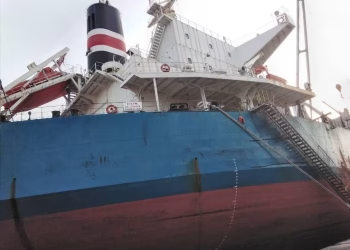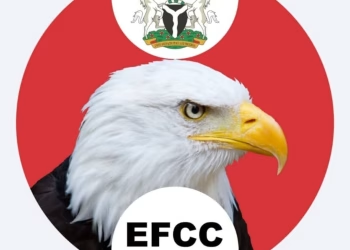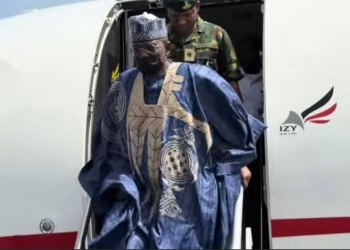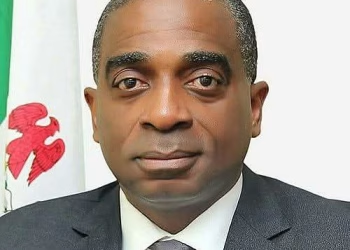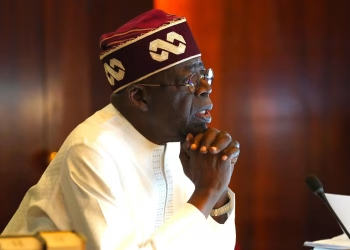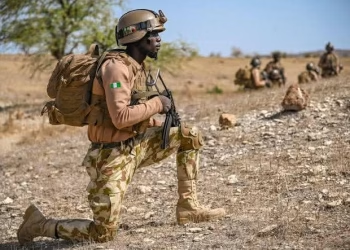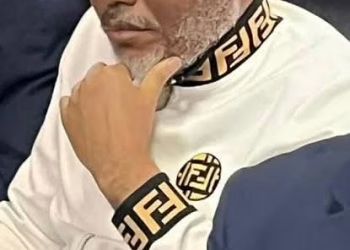A coalition of civil society groups in |Lagos on Tuesday has launched global campaign against award of contracts for ex-militants. The group said the involvement of ex-militants in oil economic management and distribution is partly responsible for the current fuel scarcity in the country.
The group said it would continue the protest to the Presidency, members of Organisation for Petroleum Exporting Countries, (OPEC), Economic Community for West African States, (ECOWAS) and the United Nations Security Council to ensure Nigeria stops the habit of awarding pipeline protection to people with historic link with terrorism, banditry and rebellion against the Nigerian State.
About a thousand members of the group gathered in Lagos with placards calling on President Bola Ahmed Tinubu tom halt the growing custom of giving oil pipelines to people associated with violence and banditry in Nigeria. The Civil Society Coalition for Mandate Protection, (CSC-MAP) established in 2010 said the campaign was necessary to stop the proliferation of arms in Nigeria.
President Bola Ahmed Tinubu should be commended for his genuine intention, his economic reforms and his courage and determination to deal with the rot in the oil sector.
Bola Ahmed Tinubu should be commended for his genuine intention, his economic reforms and his courage and determination to deal with the rot in the oil sector.
At present, the groups said, the crisis in the oil sector as seen in the current fuel scarcity is partly a product of the engagement of ex-militants in the oil economy which strengthens them to hold the country to ransom and sometimes use their network to create artificial scarcity.
and sometimes use their network to create artificial scarcity.
The group said the most dangerous threat to democracy is the proliferation of arms and pockets of violence across the country.
Addressing the rally held at Allen Roundabout in Ikeja, Lagos, the General Secretary, Mr Popoola Ajayi said President Tinubu needs peace and stability to be able to deliver the dividends of democracy.Today, we have launched the beginning of mass campaign to free Nigeria from the source of terror to create a free, prosperous and strong country.
The Civil Society Coalition for Mandate Protection, (CSC-MAP) said it is networking with local and international organisations to intensify the campaign against the award of contract to people suspected to be linked with armed insurrection against the Nigerian State
‘We have started building a network with groups across the country and in the West Africa sub region.This is the second of such rallies to sensitise Nigerians on the need to immediately stop the award of oil pipeline contracts to people associated with violence
He said the group will have these rallies in Ibadan, Kano, Port Harcourt, Abuja and at the ECOWAS headquarters. He said the rallies will be peaceful.
‘It is to depeen democracy and create peace and harmony in Nigeria. It is to block a major source of arms proliferation which undermines democratic development and sustainable livelihood in Nigeria,’ he said.
The group said this week they would deliver our protest letters to the United Nations Security Council, UNSC, OPEC and ECOWAS.
‘We are going to write letters to Presidents of all OPEC members. We are producing 1million pamphlets to be distributed across Nigeria. We are also producing T-shirts that every Nigeria can put on. We are also going to stage a protest at the National Assembly in Abuja’ Popoola said.
Speaking at the rally, Mallam Abuka Nuru, the coordinator in Northern Nigeria said ‘We want peace in Nigeria. We comment the efforts of President Tinubu. We commend his reforms in the oil sector. We commend his determination and his commitment to democracy. We support the Coastal Roads. It Will open up the Niger Delta and ensure greater business opportunities.’
He said President Tinubu has set best practices in his determination to deal poor road network between the Niger Delta and the remaining states of the Federation.
‘As he marks one year in Nigeria, we say that he his efforts are commendable. He needs to do something urgently.What President Tinubu should go further to ensure peace in Nigeria.Without peace, development is not possible. The first point of call is to tackle arms proliferation in Nigeria including the Niger Delta which produces oil, the mainstay of Nigerian economy,’he told the crowd.
The rights groups said they are worried about armed conflict in Nigeria and in the West African sub-region and the implication for peace and sustainable development in Nigeria and the danger of awarding oil pipeline contracts to leaders of armed rebels that had waged war against Nigeria in the past saying that the group is determined to forge a country where peace and prosperity reign.
The Niger Delta region is made up of nine states namely, Cross River, Edo, Delta, Abia, Imo, Bayelsa, River, Akwa-Ibom and Ondo States.What ever happens in these states, the groups said, have the potential of affecting the entire country
The CSC-MAP said awarding oil pipeline protection to ex-militants is an indirect way of arming them since they can use the funds realised from the contract to import illicit weapons into the country. ‘We are worried that the potential to hold Nigeria ransom is growing, the prospect of building individuals above the country is becoming legendary. We have to rise to this occasion.’
They said thye contracts for ex-militants violent international conventions that protect the rights of indigenous people from violence and environmental destruction.
Such conventions include but not limited to the following: The Convention on Biological Diversity (CBD) is the international legal instrument for “the conservation of biological diversity, the sustainable use of its components and the fair and equitable sharing of the benefits arising out of the utilization of genetic resources” that has been ratified by 196 nations.
There is also the Convention No. 169 represents a consensus reached by ILO tripartite constituents on the rights of indigenous and tribal peoples within the nation-States where they live and the responsibilities of governments to protect these rights.
All these conventions are relevant in the current debate. The award of contracts to elements linked with armed rebellion undermine these international conventions.
The CSC-MAP is also aware of the United Nations Declaration on the Rights of Indigenous Peoples (UNDRIP) is an international instrument adopted by the United Nations on September 13, 2007, to enshrine (according to Article 43) the rights that “constitute the minimum standards for the survival, dignity and well-being of the indigenous people.
This treaty establishes common international standards for regulating the international trade in conventional arms, and seeks to prevent and eradicate the illicit trade in conventional arms and prevent their diversion.
The Arms Trade Treaty requires all states-parties to adopt basic regulations and approval processes for the flow of weapons across international borders, establishes common international standards that must be met before arms exports are authorized, and requires annual reporting of imports and exports to a treaty
Awarding pipeline protection to people associated with banditry is dangerous and raises fundamental questions about the security of Nigeria and the prospect of continuous proliferate of arms in Nigeria.
We are also aware that the Organization of the Petroleum Exporting Countries (OPEC) is a permanent, intergovernmental Organization, created at the Baghdad Conference on September 10–14, 1960, by Iran, Iraq, Kuwait, Saudi Arabia and Venezuela.
The OPEC’s objective is to co-ordinate and unify petroleum policies among Member Countries, in order to secure fair and stable prices for petroleum producers; an efficient, economic and regular supply of petroleum to consuming nations; and a fair return on capital to those investing in the industry.
In terms of OPEC international principles, awarding oil pipeline contacts to leaders of armed groups undermines the integrity of Nigeria in OPEC and in other international forum and in the comity of nations.
Our Demands
That the United Nations Security Council should impress on the Nigerian government to stop the award of pipeline contracts to people linked in the past or present to armed insurgency in Nigeria.
That the Economic Community of West African States, ECOWAS should be aware of what is going on in Nigeria, the regional body should impress on Nigeria to stop the tradition of giving pipeline contracts to ex-militants, armed militants and known terrorists.
We have already sent a petition to Organisation of Petroleum Producing Countries, OPEC should reinforce international standards to ensure pipeline protection is not associated with armed groups and militants in any of the member states. OPEC President should as a matter of fact insist that member states must henceforth stop the award of oil contracts to armed groups.
That President Bola Ahmed Tinubu should as a matter of urgency set up a judicial inquiry to probe the proliferation of arms in Niger-Delta.
That the International community should ensure that henceforth, no pipeline contract should be given to individuals linked to banditry, kidnapping and violence in the Niger-Delta.
That the CSC-MAP will embark on intensive campaign in Nigeria and at the International community, against the award of pipeline contracts to elements associated with terrorism.
That the Nigerian President Bola Ahmed Tinubu should investigate the possible collusion of officials of Nigerian National Petroleum Company, NNPC with the deal that has surrendered pipeline protection to suspected criminal elements once associated with armed rebellion against the Nigerian State.
That the CSC-MAP is not in anyway opposed to professional stakeholders engaged in pipeline protection, our concern is the involvements of people once associated with armed insurrection against the Nigerian state.
We call for a stakeholder meeting in Nigeria that will bring together Civil Society, Ethnic Leaders to address arms proliferation and bring an end to violence and potential armed conflicts in Nigeria.
MEDIA SUMMARY FOR RALLY OF TODAY
Civil groups launch global campaign against Oil pipelines for ex-militants
Blame saboteurs for fuel scarcity
A coalition of civil society groups in |Lagos on Tuesday has launched global campaign against award of contracts for ex-militants. The group said the involvement of ex-militants in oil economic management and distribution is partly responsible for the current fuel scarcity in the country.
The group said it would continue the protest to the Presidency, members of Organisation for Petroleum Exporting Countries, (OPEC), Economic Community for West African States, (ECOWAS) and the United Nations Security Council to ensure Nigeria stops the habit of awarding pipeline protection to people with historic link with terrorism, banditry and rebellion against the Nigerian State.
About a thousand members of the group gathered in Lagos with placards calling on President Bola Ahmed Tinubu tom halt the growing custom of giving oil pipelines to people associated with violence and banditry in Nigeria. The Civil Society Coalition for Mandate Protection, (CSC-MAP) established in 2010 said the campaign was necessary to stop the proliferation of arms in Nigeria.
Presient Bola Ahmed Tinubu should be commended for his genuine intention, his economic reforms and his courage and determination to deal with the rot in the oil sector. At present, the groups said, the crisis in the oil sector as seen in the current fuel scarcity is partly a product of the engagement of ex-militants in the oil economy which strengthens them to hold the country to ransom and sometimes use their network to create artificial scarcity.
The group said the most dangerous threat to democracy is the proliferation of arms and pockets of violence across the country.
Addressing the rally held at Allen Roundabout in Ikeja, Lagos, the General Secretary, Mr Popoola Ajayi said President Tinubu needs peace and stability to be able to deliver the dividends of democracy.Today, we have launched the beginning of mass campaign to free Nigeria from the source of terror to create a free, prosperous and strong country.
The Civil Society Coalition for Mandate Protection, (CSC-MAP) said it is networking with local and international organisations to intensify the campaign against the award of contract to people suspected to be linked with armed insurrection against the Nigerian State
‘We have started building a network with groups across the country and in the West Africa sub region.This is the second of such rallies to sensitise Nigerians on the need to immediately stop the award of oil pipeline contracts to people associated with violence
He said the group will have these rallies in Ibadan, Kano, Port Harcourt, Abuja and at the ECOWAS headquarters. He said the rallies will be peaceful.
‘It is to depeen democracy and create peace and harmony in Nigeria. It is to block a major source of arms proliferation which undermines democratic development and sustainable livelihood in Nigeria,’ he said.
The group said this week they would deliver our protest letters to the United Nations Security Council, UNSC, OPEC and ECOWAS.
‘We are going to write letters to Presidents of all OPEC members. We are producing 1million pamphlets to be distributed across Nigeria. We are also producing T-shirts that every Nigeria can put on. We are also going to stage a protest at the National Assembly in Abuja’ Popoola said.
Speaking at the rally, Mallam Abuka Nuru, the coordinator in Northern Nigeria said ‘We want peace in Nigeria. We comment the efforts of President Tinubu. We commend his reforms in the oil sector. We commend his determination and his commitment to democracy. We support the Coastal Roads. It Will open up the Niger Delta and ensure greater business opportunities.’
He said President Tinubu has set best practices in his determination to deal poor road network between the Niger Delta and the remaining states of the Federation.
‘As he marks one year in Nigeria, we say that he his efforts are commendable. He needs to do something urgently.What President Tinubu should go further to ensure peace in Nigeria.Without peace, development is not possible. The first point of call is to tackle arms proliferation in Nigeria including the Niger Delta which produces oil, the mainstay of Nigerian economy,’he told the crowd.
The rights groups said they are worried about armed conflict in Nigeria and in the West African sub-region and the implication for peace and sustainable development in Nigeria and the danger of awarding oil pipeline contracts to leaders of armed rebels that had waged war against Nigeria in the past saying that the group is determined to forge a country where peace and prosperity reign.
The Niger Delta region is made up of nine states namely, Cross River, Edo, Delta, Abia, Imo, Bayelsa, River, Akwa-Ibom and Ondo States.What ever happens in these states, the groups said, have the potential of affecting the entire country
The CSC-MAP said awarding oil pipeline protection to ex-militants is an indirect way of arming them since they can use the funds realised from the contract to import illicit weapons into the country. ‘We are worried that the potential to hold Nigeria ransom is growing, the prospect of building individuals above the country is becoming legendary. We have to rise to this occasion.’
They said thye contracts for ex-militants violent international conventions that protect the rights of indigenous people from violence and environmental destruction.
Such conventions include but not limited to the following: The Convention on Biological Diversity (CBD) is the international legal instrument for “the conservation of biological diversity, the sustainable use of its components and the fair and equitable sharing of the benefits arising out of the utilization of genetic resources” that has been ratified by 196 nations.
There is also the Convention No. 169 represents a consensus reached by ILO tripartite constituents on the rights of indigenous and tribal peoples within the nation-States where they live and the responsibilities of governments to protect these rights.
All these conventions are relevant in the current debate. The award of contracts to elements linked with armed rebellion undermine these international conventions.
The CSC-MAP is also aware of the United Nations Declaration on the Rights of Indigenous Peoples (UNDRIP) is an international instrument adopted by the United Nations on September 13, 2007, to enshrine (according to Article 43) the rights that “constitute the minimum standards for the survival, dignity and well-being of the indigenous people.
This treaty establishes common international standards for regulating the international trade in conventional arms, and seeks to prevent and eradicate the illicit trade in conventional arms and prevent their diversion.
The Arms Trade Treaty requires all states-parties to adopt basic regulations and approval processes for the flow of weapons across international borders, establishes common international standards that must be met before arms exports are authorized, and requires annual reporting of imports and exports to a treaty
Awarding pipeline protection to people associated with banditry is dangerous and raises fundamental questions about the security of Nigeria and the prospect of continuous proliferate of arms in Nigeria.
We are also aware that the Organization of the Petroleum Exporting Countries (OPEC) is a permanent, intergovernmental Organization, created at the Baghdad Conference on September 10–14, 1960, by Iran, Iraq, Kuwait, Saudi Arabia and Venezuela.
The OPEC’s objective is to co-ordinate and unify petroleum policies among Member Countries, in order to secure fair and stable prices for petroleum producers; an efficient, economic and regular supply of petroleum to consuming nations; and a fair return on capital to those investing in the industry.
In terms of OPEC international principles, awarding oil pipeline contacts to leaders of armed groups undermines the integrity of Nigeria in OPEC and in other international forum and in the comity of nations.
Our Demands
That the United Nations Security Council should impress on the Nigerian government to stop the award of pipeline contracts to people linked in the past or present to armed insurgency in Nigeria.
That the Economic Community of West African States, ECOWAS should be aware of what is going on in Nigeria, the regional body should impress on Nigeria to stop the tradition of giving pipeline contracts to ex-militants, armed militants and known terrorists.
We have already sent a petition to Organisation of Petroleum Producing Countries, OPEC should reinforce international standards to ensure pipeline protection is not associated with armed groups and militants in any of the member states. OPEC President should as a matter of fact insist that member states must henceforth stop the award of oil contracts to armed groups.
That President Bola Ahmed Tinubu should as a matter of urgency set up a judicial inquiry to probe the proliferation of arms in Niger-Delta.
That the International community should ensure that henceforth, no pipeline contract should be given to individuals linked to banditry, kidnapping and violence in the Niger-Delta.
That the CSC-MAP will embark on intensive campaign in Nigeria and at the International community, against the award of pipeline contracts to elements associated with terrorism.
That the Nigerian President Bola Ahmed Tinubu should investigate the possible collusion of officials of Nigerian National Petroleum Company, NNPC with the deal that has surrendered pipeline protection to suspected criminal elements once associated with armed rebellion against the Nigerian State.
That the CSC-MAP is not in anyway opposed to professional stakeholders engaged in pipeline protection, our concern is the involvements of people once associated with armed insurrection against the Nigerian state.
We call for a stakeholder meeting in Nigeria that will bring together Civil Society, Ethnic Leaders to address arms proliferation and bring an end to violence and potential armed conflicts in Nigeria.



